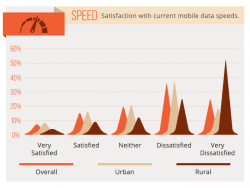In October 2014, Tiger Mobiles carried out a survey of 4,300 smartphone users who had taken out a 3G or 4G enabled phone contract with at least 1GB of monthly data allowance in the last 12 months.
The survey quizzed respondents in a number of areas including their overall happiness with their current mobile data speed, what they believed the benefits of faster mobile internet were, how things have changed in the last 3 years and where mobile internet speeds would be in another 3 years’ time.
Why This Mobile Internet Survey Was Undertaken
Tiger Mobiles realise that mobile internet is becoming more and more important for the consumer when choosing a phone contract. The reasoning for this report is as follows:
First, internet usage on the whole is growing exponentially:
- According to Cisco Global Internet traffic in 2018 will be equivalent to 64 times the volume of the entire global Internet in 2005.
- The same research states that over half of all IP traffic will originate with non-PC devices by 2018. In 2013, only 33% of total IP traffic originated with non-PC devices, but by 2018 the non-PC share of total IP traffic will grow to 57 =%. PC-originated traffic will grow at a CAGR of 10%, while TVs, tablets, smartphones, and machine-to-machine (M2M) modules will have traffic growth rates of 35%, 74%, 64%, and 84%, respectively.
Second, mobile data will playing a huge part in this increase:
- Cisco also reveals that globally, mobile data traffic will increase 11-fold between 2013 and 2018. Mobile data traffic will grow at a CAGR of 61% between 2013 and 2018, reaching 15.9 exabytes per month by 2018.
- Cisco also states that Global mobile data traffic will grow three times faster than fixed IP traffic from 2013 to 2018. Global mobile data traffic was 3% of total IP traffic in 2013, and will be 12% of total IP traffic by 2018.
Third, the UK is currently in the middle of a 4G rollout from all the major network operators, all the major players have ambitious plans but rural areas are still lacking the speeds of those in urban areas.
- EE are aiming to reach 90% of the UK with 4G by the end of 2014.
- 02 plan to reach 98% of the population with 2G, 3G and 4G indoor and outdoor coverage before 2017 bringing high-speed connectivity to some areas that have never have had this access before.
- Vodafone are on a mission to bring ultrafast 4G to 98 per cent of the UK population by the end of 2015.
- Three aim to reach parts of 50 cities and many more towns by the end of 2014 and cover 98% of the UK population by the end of 2015.
With all that in mind this survey aims to help provide further information on the needs and expectations of UK smartphone users when it comes to mobile data.
Mobile Data Speeds and Expectations
- 60% of respondents are dissatisfied with the data speed on their smartphone.
- 82% of users expect websites to load as quickly on their smartphone via mobile data as they do via fixed line broadband.
- However, over half (56%) said websites load more slowly on their smartphone.
- 82% of those surveyed had a problem trying to load a website over a data connection in the last year whilst 79% had difficulty using apps that require a data connection to function properly.
- 85% revealed they would access websites more often from their phone via mobile data if the experience was as fast and reliable.
- 55% are dissatisfied with the overall reliability of mobile data.
Benefits of higher mobile data speeds
- Overall, 49% say that faster mobile date speeds would help with their productivity.
- 62% think it would allow them to get more use out of their smartphone.
- 18% say that faster mobile data speeds would encourage their employer to offer more flexible and remote working opportunities.
The last 3 years in mobile internet – getting faster
- Overall 16% believe that mobile data speeds have got significantly faster in the last 3 years, 43% believe speeds are slightly faster. By comparison just 4% believe they have got significantly slower.
- Respondents in rural areas err more on the side of caution with 14% believing that data speeds have become slightly slower in the last 3 years.
The next 3 years – people anticipate speed increases
- Overall 45% think that mobile data speeds will get significantly faster, 28% slightly faster and just 9% believing they will get slower in some capacity.
- Urban respondents are the most upbeat with a combined 74% believing that mobile data will improve in speed over the next 3 years, compared to 65% of rural respondents.
Source: TigerMobiles.com










